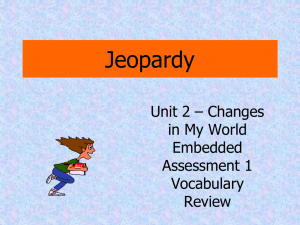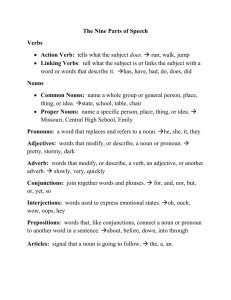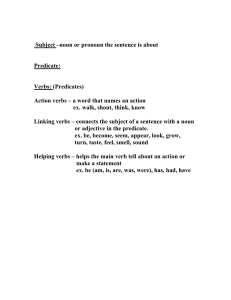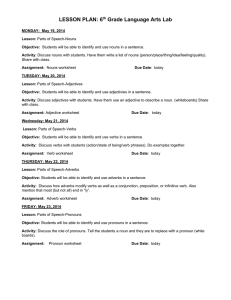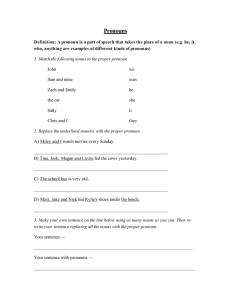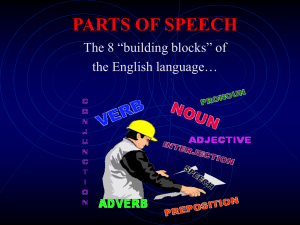Saved by the Bell: Bellwork Weeks #1-2 Week #1
advertisement
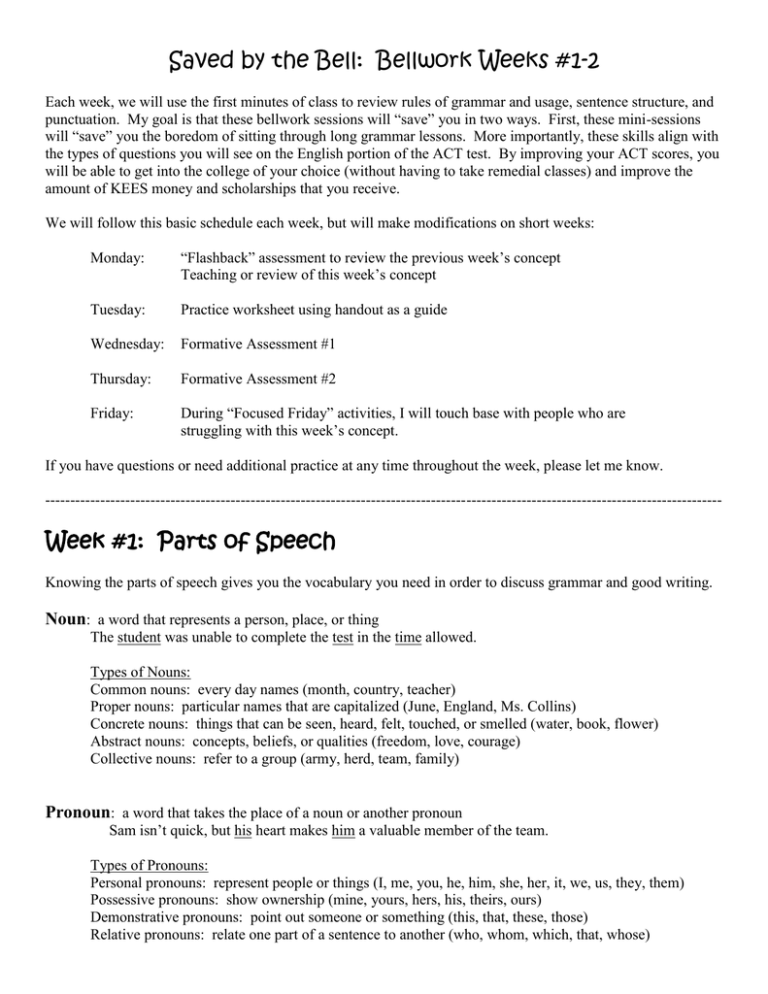
Saved by the Bell: Bellwork Weeks #1-2 Each week, we will use the first minutes of class to review rules of grammar and usage, sentence structure, and punctuation. My goal is that these bellwork sessions will “save” you in two ways. First, these mini-sessions will “save” you the boredom of sitting through long grammar lessons. More importantly, these skills align with the types of questions you will see on the English portion of the ACT test. By improving your ACT scores, you will be able to get into the college of your choice (without having to take remedial classes) and improve the amount of KEES money and scholarships that you receive. We will follow this basic schedule each week, but will make modifications on short weeks: Monday: “Flashback” assessment to review the previous week’s concept Teaching or review of this week’s concept Tuesday: Practice worksheet using handout as a guide Wednesday: Formative Assessment #1 Thursday: Formative Assessment #2 Friday: During “Focused Friday” activities, I will touch base with people who are struggling with this week’s concept. If you have questions or need additional practice at any time throughout the week, please let me know. --------------------------------------------------------------------------------------------------------------------------------------- Week #1: Parts of Speech Knowing the parts of speech gives you the vocabulary you need in order to discuss grammar and good writing. Noun: a word that represents a person, place, or thing The student was unable to complete the test in the time allowed. Types of Nouns: Common nouns: every day names (month, country, teacher) Proper nouns: particular names that are capitalized (June, England, Ms. Collins) Concrete nouns: things that can be seen, heard, felt, touched, or smelled (water, book, flower) Abstract nouns: concepts, beliefs, or qualities (freedom, love, courage) Collective nouns: refer to a group (army, herd, team, family) Pronoun: a word that takes the place of a noun or another pronoun Sam isn’t quick, but his heart makes him a valuable member of the team. Types of Pronouns: Personal pronouns: represent people or things (I, me, you, he, him, she, her, it, we, us, they, them) Possessive pronouns: show ownership (mine, yours, hers, his, theirs, ours) Demonstrative pronouns: point out someone or something (this, that, these, those) Relative pronouns: relate one part of a sentence to another (who, whom, which, that, whose) Reflexive pronouns: reflect back to someone or something else in the sentence (myself, yourself, himself, herself, itself, ourselves, yourselves, themselves) Interrogative pronouns: ask a question (who, whom, which, whose, what) Indefinite pronouns: do not refer to a specific person or thing (all, any, both, everyone, many, most, several, some, etc.) Adjective: a word that modifies a noun or pronoun My lucky sister had an enormous ice cream cone. Articles: these specific types of adjectives are a, an, and the. Verb: a word that expresses action or a state of being We never found the necklace that Tina lost last week. Types of Verbs: Action verbs: verbs that express action (jumped, called, yelled, slept, cried) Linking verbs: verbs that connect the subject with a word or words that identifies it. Common linking verbs are: be, being, been, am, is, are, was, were, has been, should have been, appeared, became, looked, sounded, etc. Mr. Hornsby is a coach. The soup tasted wonderful. Auxiliary (Helping) verbs: help the main verb express action, voice, or tense (is, has, can, did, were, etc.) The officers had been planning the raid for months. She will arrive by 6:00. Adverb: a word that modifies a verb, adjective, or adverb. They often end in –ly. He was very upset that the game ended so quickly. Tip: Adverbs usually answer the question: How? When? Where? Why? Under what circumstances? How much? How often? To what extent? Preposition: a word that shows the relation of a noun or pronoun to another word. Kim has always wanted to go to Italy for a long time. Tip: Prepositions sometimes tell the position of something (in out, under, over, above, etc.) Conjunction: a word that connects words or group of words (and, but, so, or, for, nor, both, neither/either) Michelle and John walked to the park and fed the birds. Interjection: a word or phrase used to express emotion or as a filler (hey, well, ouch!) Wow! I can’t believe you just did that. Week #1 Practice: Identify the parts of speech of each of the underlined words. If it is an adjective or adverb, draw an arrow pointing to the word it is modifying. 1. Hey, this package is too light to be the DVDs I ordered! 2. No down payment is necessary for this credit purchase. 3. Down jackets are especially appropriate for the arctic climate. 4. Her answer, although not what we expected, was both timely and accurate. 5. Please light the oven, or dinner won’t be ready at 7:00 pm. 6. The boss let the workers leave early today. Week #2: Basic Sentence Structure Some of the most common problems in student writing have to do with incorrect sentence structure. This week we will review the basic components of a sentence and identify three common sentence errors. The Basics: Every sentence must: 1. have a subject (contains the main noun and tells who or what the sentence is about) 2. have a predicate (contains the main verb and tells something about the subject) 3. express a complete thought. About the subject and predicate: The complete subject is the person, place, or thing that the sentence is about, along with all the words that modify it. The simple subject is the main noun or pronoun. The complete predicate is what the subject is going or what condition the subject is in. The simple predicate is the main verb. Practice: Underline the complete subject and predicate, then circle the simple subject and predicate. The aged, white-haired gentleman walked slowly down the hall. Building the Sentences: Although some sentences are complete with only a subject and predicate, many others need something else to complete their meaning. Two of the most common additions are direct and indirect objects. Direct Objects: the word or words that receive the action of the verb. Direct Objects are nouns or pronouns. Practice: The little boy constantly dribbled the basketball in the playground. Boy is the subject and dribbled is the verb. Circle the direct object. I took the donation to the fundraiser. I is the subject and took is the verb. Circle the direct object. Indirect Objects: comes before a direct object and answers the questions to whom? or for whom? Practice: Kyle reluctantly gave Linda the keys to his new car. Kyle is the subject, gave is the verb, and keys is the direct object. Circle the indirect object. I asked Ms. Miller the question. I is the subject, asked is the verb, question is the direct object. Circle the indirect object. Common Sentence Mistakes: Fragment: a group of words that does not express a complete thought. Run-on Sentence: expresses two or more complete thoughts, but lacks the necessary punctuation Comma Splice: has two or more complete thoughts that are spliced together with just a comma How to Fix These Mistakes: Fragments can often be corrected by adding words to complete the thought or joining the fragment with the sentence before or after it. Practice: Turn this fragment into a complete sentence: Before I can go out with my friends. Run-on Sentences can be corrected by adding a period, semi-colon, or comma with a coordinating conjunction between the complete thoughts (we will cover this in more depth in a later week). Practice: Correct this run-on sentence. I brought the hamburgers and hotdogs to the picnic my mom brought side dishes. Comma Splices can be corrected by adding a coordinating conjunction (and, but, or, so, for, yet, nor) before the comma. Practice: Correct this comma splice. Jeff wanted to go to the game, Jordan wanted to watch a movie. Week #2 Practice: Identify each group of words as a complete sentence, fragment, runon, or comma splice. Correct all problems to form complete sentences. 1. I like to read the sports section of the newspaper first, my sister starts with the comics. 2. He put on his coat, boots, and hat; he would never again risk getting so cold in the winter. 3. We should have clubs at school. Like clubs for board games, euchre, and school spirit. 4. Even though I studied very hard, I still got a C on the test. 5. Scared stiff by the intense wind and storm. 6. Although she earned a lot of money. Tami hated going to work every day. 7. I am going to bring the birthday cake my sister is bringing decorations and my brother is bringing the presents. 8. The lone woman trudged up the muddy riverbank. Determined that she would make the best of a bad situation. Because of her family’s recent run of bad luck. She knew that she had to contribute to the family’s finances. That’s why she had accepted a position in this new town.
